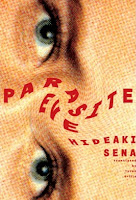 This is my first time reading anything
in this genre. When I think of Japanese Horror, I immediately think of Silent Hill video games, Resident Evil and Castlevania. My all time favorite Japanese horror games since childhood is Parasite eve, two game which were release for playstation and additional game recently release for the PSP called Third Birthday. These games are actually based of a novel by Hideaki Sena. The story is more biochemical horror rather than myths and legends. Parasite Eve played a major role in bringing japanese horror literature to modern America. The book also one the first Japan Horror Novel Award. I recommend reading this book, its starts slow in the beginning but give it a chance.
This is my first time reading anything
in this genre. When I think of Japanese Horror, I immediately think of Silent Hill video games, Resident Evil and Castlevania. My all time favorite Japanese horror games since childhood is Parasite eve, two game which were release for playstation and additional game recently release for the PSP called Third Birthday. These games are actually based of a novel by Hideaki Sena. The story is more biochemical horror rather than myths and legends. Parasite Eve played a major role in bringing japanese horror literature to modern America. The book also one the first Japan Horror Novel Award. I recommend reading this book, its starts slow in the beginning but give it a chance.
Unfortunately, I could not get my hands on the
required reading, A Wild Sheep Chase by
Haruki Murakami. Instead I read the alternative or additional Reading
Kwaidan: Stories and Studies of Strange Things by
Lafcadio Hearn. I read all seven recommended stories: The
Story of Mimi-Hashi-Hoichi, Diplomacy, Of a Mirror and a Bell,
Jikiniki, Mujina, Rokura-Kubi. Reading his stories were difficult at first because of the foreign names and words that were exclusive to the language. They
are all simple stories, but very enjoyable to read. All of his
stories have a similar structure, beginning with location of the
story, the legend of the location, and the main character along with his or her occupation; very cut and dry. The
author is still captures the reader, even within a few paragraphs,
most of his stories are a few short pages. Each of his stories have
one key element, the shock factor, which leaves an last impression on the reader. The relationships that are
developed between the characters are simple yet deep.
My
favorite stories from the seven are The Story of
Mimi-Hashi-Hoichi, Diplomacy, and Jikiniki. His
other stories are just as enjoyable, these three had the biggest
impression on me. The relationship between Hoichi, the blind man who
performed historical recitations with his four sting lute, and the
priest is very touching in The Story of Mimi Hashi Hoichi.
When Hoichi has his ears ripped
oh by the ghost samurai, its rather impressive how he doesn't scream
in agony. In Diplomacy, the
lead samurai's wittiness is admirable. He has the right character
traits of a true leader, he doesn't flinch at fear and he doesn't
make foolish actions.
In
Japanese culture, from what I have gathered from these short stories,
is heavily wrapped in legends, myths and karma. How you treat others
and honestly feel, reflects how life will treat you in return. If you
are respectful towards people and are well mannered, your goodness
will be rewarded. In contrast to Japanese myths, American stories are
more about conquering and wealth. Good morale and honor isn't as
prominent in American culture. Its also fascinating how ghosts and
demons exist in Japanese culture. These elements act as a medium to
convey morals supernaturally yet apply to normal people.
No comments:
Post a Comment